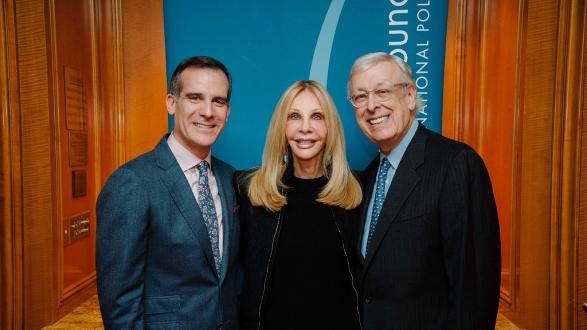This summer, Pacific Council members Marc and Jane Nathanson received an award from the Aspen Institute Socrates Program to recognize their longtime support of the Aspen Institute and the creation of the Nathanson Public Diplomacy Scholarship. The scholarship, set up by the Nathansons in 2016, allows young professionals in government to partake in the Socrates Program, which is a series of expert-moderated dialogues on contemporary topics that take place in cities around the world. The seminars facilitate idea exchange and cultivate personal reflection, professional development, and diverse networking opportunities for participants.
The Pacific Council recently caught up with Marc Nathanson, who currently serves as co-chair of the Council’s Board of Directors, to hear about his passion for public diplomacy and public service and how it resonates through his leadership role at the Council.
_____________________
Pacific Council: What inspired you and Jane to start the Nathanson Public Diplomacy Scholarship Fund?
Marc Nathanson: We thought it was appropriate because we found many people in government, especially in the eight years I was at the Broadcasting Board of Governors, who were very talented and dedicated to careers in public service. But they didn’t have many opportunities to advance their own leadership training and thought process. Because we were already involved in the Aspen Institute, and we were very familiar with the Socrates Program—I had gone through a similar seminar myself for board members—so it just made sense to offer this to people who were dedicated to public service.
How do you think institutions like the Pacific Council and the Aspen Institute can cut through the clutter of today’s political media landscape?
The content must be unbiased, non-partisan and factual. When our members and the public in general read things on the Pacific Council’s website, they are getting articles and information in a very professional and objective way. If you’re interested in international affairs and live in Southern California, the Pacific Council is the place to go to because you come together with people who are also interested in the world.
In your opinion, what is the most effective way the Pacific Council is contributing to public discourse?
We are very up-to-date in informing our members, whether by teleconference or in-person meetings or seminars, with what is happening in current hot spots in the world. Whether that’s in Yemen or South Africa or South America, we’re very in tune with what is going on right now.
Our members are looking to learn more than the coverage in local media about what’s going on in a very troubled hot spot. The Council has access to experts in that area and they make them available to their members. That gives great insight for people who want to know more about what’s going on.
How has your experience leading the Pacific Council as co-chair of our Board of Directors been? Do you have a particularly memorable moment?
There have been many memorable moments. What is very important is that it’s a place for civil dialogue. We see a lot of polarization in Washington. The Pacific Council is a safe place for people of different views who come together to discuss different issues of international policy ramifications.
I think it’s a wonderful thing that we offer that to our members. In my first three years (as co-chair), and now in my second term, there are so many people I run into in Southern California who are interested in what’s going on in the world. We live in a global economy; LA is really a global city. What the Pacific Council is doing, and in particular with our current Mayor Eric Garcetti, we realize we are not isolated in our community, but what goes on in the world affects our community and the rest of the country.
"Part of the mission of the Pacific Council is to promote better understanding, have civil dialogue about this, and to talk to people throughout the world."
Marc Nathanson
Pacific Council has done a lot in this area, and now we even see there is a deputy mayor of international affairs. You see the ports, they are so important to international trade. The mayor just went to Asia to discuss Southern California businesses and the economy. If we look at tourism alone, LA is one of the prime areas that people want to come to.
Part of the mission of the Pacific Council is to promote better understanding, have civil dialogue about this, and to talk to people throughout the world.
What can the Pacific Council learn from an organization as old and renowned as the Aspen Institute?
Since 1949, the Aspen Institute has had its leadership programs for specific segments of the population. I think the Pacific Council should attract new and younger members and work with them beyond inviting them to seminars and lectures, in their own area of leadership training. Particularly under-served parts of the community. It’s a natural transition for us.
_____________________
Learn more about the Nathansons’ work here.




